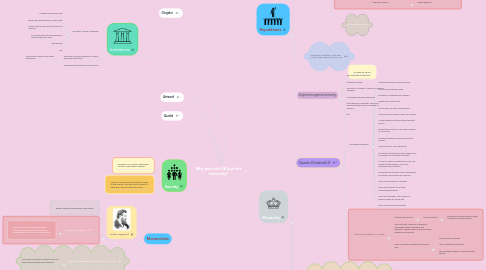
1. Monarchists
1.1. Walter Bagehot
1.1.1. British journalist, businessman, and essayist
1.1.2. The English Constitution
1.1.2.1. The functioning of Parliament and the British monarchy as well as the contrasts between British and American government
1.2. Support for a monarchy in 1993-69% but in 2016- 76%
1.2.1. According to pollsters ''probably the most stable trend we have ever measured''
2. Institutions
2.1. The 1950s- period of changes
2.1.1. Strongly influenced by war
2.1.2. Bretain was governed by a Labour party
2.1.3. Britain spent 6.6 per cent of its GDP on defence
2.1.4. Food rationing encourage people to produce their own food
2.1.5. Bureaucracy
2.1.6. Ect.
2.2. The impact of Americanisation, colonial, European immigration
2.2.1. Institutional authority was being questioned
2.3. The globalisation and the financial crisis
3. Society
3.1. England is an ''old and complicated society'' wrote Walter Bagehot
3.2. Society is compared to the theatrical show, to the lords etc. but they can't compare to the queen, she is too abstract, magic
4. Quizlet
5. Artword
6. Glogster
7. Republicans
7.1. Thomas Paine
7.1.1. English-American, political theorist and revolutionary
7.1.2. Common Sense-pamphlet
7.1.2.1. in the 17th and 18th centuries, group of British colonies declare independence and forme the United States of America
7.1.2.2. Republicanism
7.1.2.3. "One of the strongest natural proofs of the folly of the hereditary right in kings, is, that nature disapproves it, otherwise she would not so frequently turn it into ridicule by giving mankind an ass for a lion."
7.1.2.3.1. He did't agree that previous generations dictating the rules of future generations
7.1.2.4. "prejudice of Englishmen" for monarchy, arising "as much or more from national pride than reason"
7.1.2.4.1. Hold on nonsensical political system for tradition's sake and not because there's any reason behind it
7.1.3. Meritocratic principles
7.2. Support for a republic in 1969-18%, in 1993, 2002-19% and in 2016-17%
7.3. Arguments against monarchy
7.3.1. The monarchy is expensive
7.3.2. Hereditary system
7.3.3. Concept it is archaic, it remins of medieval feudalism
7.3.4. A monarchy demands deference
7.3.5. According to monarchists, the title is something that anyone can aspire to become
7.3.6. Ect.
8. Monarchy
8.1. Queen Elizabeth II
8.1.1. 60 years on throne
8.1.2. Privileges and powers
8.1.2.1. The Queen needs no license to drive
8.1.2.2. She needs no passport eithe
8.1.2.3. She gets to celebrate two birthdays
8.1.2.4. Queen has a private poet
8.1.2.5. She also has a private cash machine
8.1.2.6. She owns all the swans in the River Thames
8.1.2.7. All the dolphins in British waters belong to her too
8.1.2.8. Without her consent, no bill can be passed to form a law
8.1.2.9. She has the power to appoint Lords and Knights
8.1.2.10. She can opt out from paying tax
8.1.2.11. Her family (and she) have been spared from all Freedom of Information requests
8.1.2.12. In times of "grave constitutional crisis", the Queen has the power to VETO any ministerial advice/opinion
8.1.2.13. The Queen has the right to be consulted, to encourage, and to warn her ministers
8.1.2.14. She's also the Queen of Australia
8.1.2.15. She's also dominion to all these commonwealth realms
8.1.2.16. She's also the head of the Church of England under her formal title
8.1.2.17. She's immune from prosecution
8.1.3. The Coronation in 1952
8.1.3.1. After the World War II
8.1.3.1.1. Age of Austerity
8.1.3.2. The event was a fabulous, flamboyant, extravagant with all the pomp and pageantry, feathers and fur, gold and jawls, anthems and trumpets
8.1.3.3. Two sociologists: Michael Young and Ed Shils
8.1.3.3.1. Overall: waste of money
8.1.3.3.2. ''Act of national communion''
8.1.3.3.3. The Coronation gave an contact with the sacred
8.2. "The mystic reverence, the religious allegiance, which are essential to a true monarchy, are imaginative sentiments that no legislature can manufacture in any people,"
8.2.1. History, rituals,
8.2.2. The monarchy is more complex than we think
